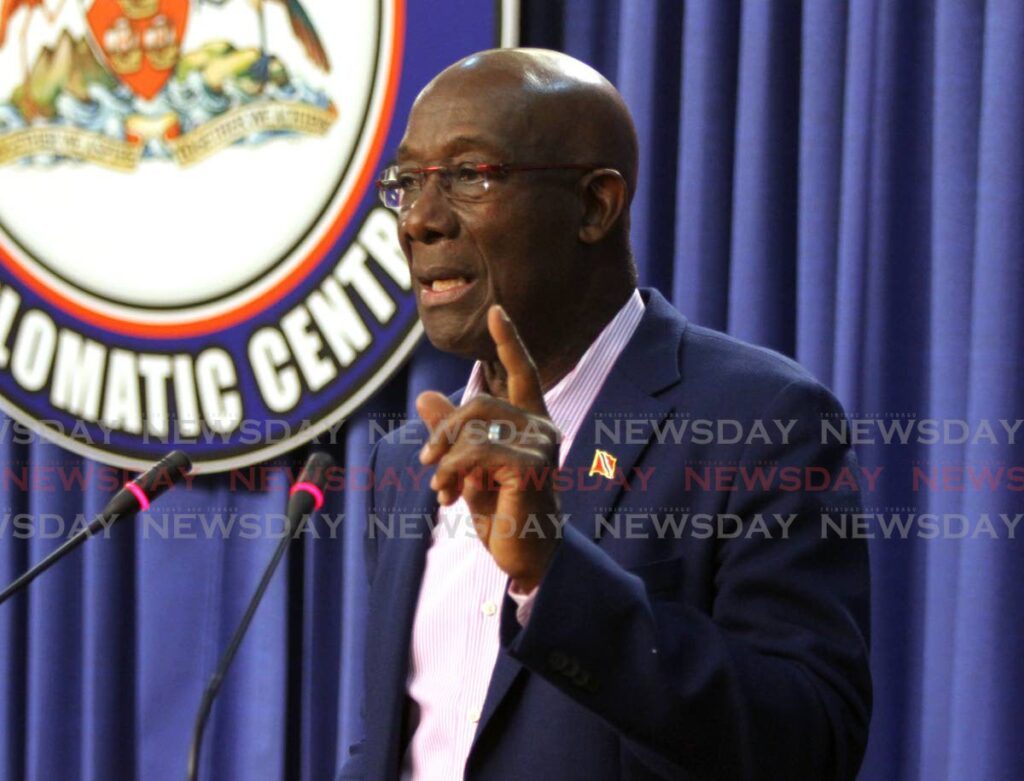Caricom, Canada working together on safety, security

The Prime Minister says security and safety are two major issues with which Canada can assist the Caribbean Community (Caricom). Dr Rowley said the crime situation in the region was worsening, with the proliferation of arms and ammunitions contributing to the crisis.
Speaking during the session on regional security and Haiti during the Canada-Caricom summit in Ottawa on Wednesday, Rowley said there has been an explosion in the use of illegal arms and ammunition.
“The data now shows that we’re losing by violent killings about 15 people a day in the Caricom region, nearly all of it by the use of firearms. There’s a proliferation in recent times of assault weapons, so the instances of shootings usually end up with multiple casualties, many deaths. Because of the operationalisation of gangs and the relative ease of which the arms and ammunition are coming into the region, gangs have been arming themselves more and more effectively and efficiently. They have become better killing machines, to the point now where they pose a threat to the state itself.”
He said in Trinidad and Tobago recently there had been two major arms finds, including 50-calibre weapons and armour-piercing ammunition.
“So people are arming themselves to carry out their criminal business, largely the drug trade and of course the human-trafficking trade.
"In talking to Canada, it’s not the same conversation we’d have with the US, because we’d tell them straight that they are producing these things and they’re easy to get.”
He listed five areas in which Canada’s co-operation could benefit the region. The first was that Caricom countries needed to be able to patrol their coastal areas with small craft, which were difficult to acquire immediately.
“I’m amazed how difficult it is to get small craft for littoral-zone patrolling, but Canada has a long coastline, you have good business, and it may very well be that in conversation with your people we might be able to find some assistance in that.
"We’re not talking here about handouts, we’re talking about actually getting the equipment to be able to help us patrol our littoral zones.”
Another issue was the effectiveness of the police and the need for training.
“We have to admit the criminal element engaged in this violence using the arms and ammunition have grown their ability faster than the police have been able to cope with it. We’ll need improved police training and more effective policing, and this is an area where we believe Canada can help us with, because your management of policing is something quite significant.
“Again, collaboration, co-operation and training the trainer and getting some assistance with our middle- to upper-level management police officers to bring about better management of the criminal on-surge, that would definitely help.”
Rowley said cybersecurity was now an imperative, as a significant amount of crime and criminality was carried out in cyberspace, and collaboration with Canadian experts could increase Caricom’s ability to cope with the threat.
He said the collaboration between the Canadian and Caricom parliaments had been beneficial, but the laws and regulations in place in Caricom were not made for modern times.
“The laws and the regulations we have in place now, which are operating in the courts, they don’t cater for the population that exists today. They catered for a different breed of people, where there was some moral compass, some underpinning of good behaviour, some expectation of integrity in the institutions.
"If we do not adjust our legal responses, the courts then become a mockery and laughed at by the criminals, because when you get before the court and the court pretends to be this moral arbiter, the criminals become the victims, and their concerns become the primary concerns, because you can’t do them this and you can’t do them that, and they just carry on what is an ongoing criminal enterprise.”
Rowley said after the recent Caricom symposium on crime, the region had declared violent crime a public health issue.
“There are very few diseases that are killing (more) people in Caricom than arms and ammunition, so that’s where it’s at, and we believe there are some areas where collaboration with the Canadian authorities and experts and your institutions can help.”
Speaking at the closing ceremony of the summit, Rowley said it was essential to acknowledge Caricom and Canada were stronger together.
“Even If we want to disregard the legacy of our history, our diaspora won’t let us, so it is important for us to use what we have, which is that common sense of purpose, our Commonwealth commitment, our belief in democracy and the decency of the human being.
“We found common ground with respect to Canada’s strengths that can be made available to us in the region on the issue of regional security, national safety and security, providing of equipment, which we find difficult in the region; standing with us and voicing our concerns about being disregarded in the international community of financing response to climate change; standing in defence with us, where only this week we’re reporting that two of our Caricom nations have found themselves excluded from the international banking community and all the trouble that that means; and standing with us in taking common positions on matters: even if the troubles are far away, the effects are close to us, like the Middle East, and coming out of the covid19 experience.
"There’s a lot that TT, Caricom and Canada have in common, and we intend to ensure our strengths work for us and we remain not just friends, but brothers of the North and the Caribbean, the zone of peace.”

Comments
"Caricom, Canada working together on safety, security"